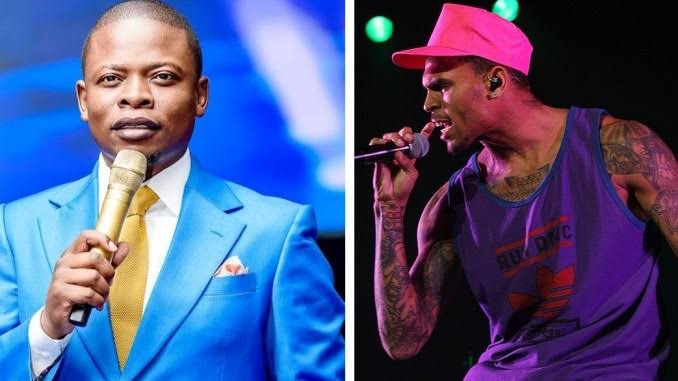
Prophet Shepherd Bushiri, who notably evaded arrest in South Africa a few years ago, has expressed frustration over the media’s lack of coverage regarding his significant achievement. Bushiri claims to have filled the FNB Stadium in Johannesburg—one of the largest venues in Africa—with 110,000 people for four consecutive years, which he describes as an “all-time high.” However, he argues that this monumental accomplishment has been overlooked by the media due to what he perceives as a bias against him.
In a recent statement, Bushiri lamented the media’s failure to acknowledge his achievements, accusing them of “hating” him. He suggested that the press does not adequately celebrate the accomplishments of religious leaders like himself, while at the same time, it heavily covers events and figures he deems less deserving of attention. He pointed specifically to the extensive media coverage of American singer Chris Brown’s performances in South Africa as a glaring example of this supposed bias.
Bushiri’s discontent stems from his belief that South Africa’s media landscape is skewed towards celebrating secular achievements, often at the expense of spiritual and religious milestones. He argues that such a perspective unfairly diminishes the contributions of religious leaders and their followers. According to Bushiri, his ability to fill the FNB Stadium with thousands of people over several years should be celebrated as a testament to the spiritual awakening and the power of his ministry, yet it remains largely ignored.
The prophet’s claims are grounded in his perception of a broader societal shift in South Africa—a move towards what he terms “celebrating evil.” He argues that while secular figures like Chris Brown receive extensive praise, religious figures who preach righteousness and spiritual growth are marginalized. This, he claims, reveals a deeper societal agenda that he believes will eventually become evident to South Africans.
Bushiri’s comments come at a time when religious leaders in South Africa are increasingly speaking out against what they see as media bias. Many argue that the media’s focus on celebrity culture and entertainment overshadows the influence and impact of religious figures who are integral to many South Africans’ lives. Bushiri’s case exemplifies this frustration, highlighting a perceived disconnect between public recognition and religious achievement.https://x.com/MDNnewss/status/1868617712202551455?s=08
While Bushiri’s claims might be viewed as contentious, they resonate with a growing concern among some religious leaders in South Africa about the portrayal of faith-based achievements in the public sphere. His comments underscore a deeper debate about the role of religion in South African society and the media’s role in shaping public opinion. For many of his followers, Bushiri’s ability to fill the FNB Stadium is a testament to his spiritual influence and the growing appeal of his ministry. However, for critics, his achievements do not warrant the same level of media attention as those of secular figures like Chris Brown.
In response to Bushiri’s accusations, some media outlets have defended their coverage practices, asserting that their primary aim is to provide a balanced representation of various public figures and events, regardless of their nature. They argue that media coverage should not be biased towards religious leaders or celebrities but rather should reflect the diverse interests of the public. Nonetheless, Bushiri’s comments have sparked a broader conversation about the balance of media representation in South Africa and the values it upholds.
Ultimately, the debate surrounding Bushiri’s claims sheds light on the ongoing tensions in South Africa between secularism and spirituality. As the country continues to grapple with its post-apartheid identity, issues of media bias and cultural celebration remain significant points of contention. Whether or not one agrees with Bushiri’s views, his comments serve as a provocative reminder of the complex dynamics at play in South African society.







